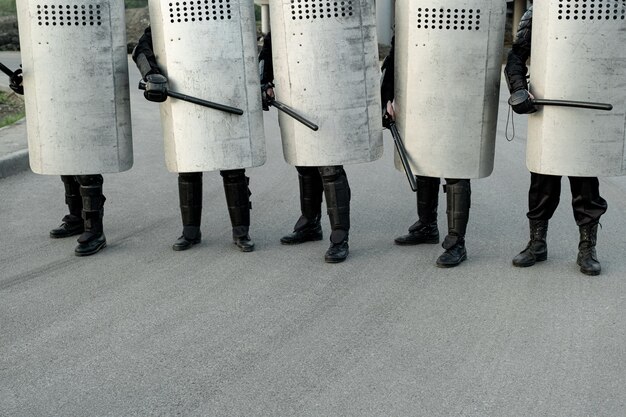The UN’s Role in Global Conflict Resolution: Effectiveness and US Support

The Role of the United Nations in Resolving Global Conflicts centers on its capacity to mediate disputes, deploy peacekeeping forces, and foster diplomatic solutions, while the effectiveness of these interventions and the extent of US support remain subjects of ongoing debate and evaluation.
The United Nations has long been at the forefront of international efforts to resolve global conflicts. But how effective has the UN been in practice, and what role does the United States play in supporting—or hindering—its mission? Understanding the Role of the United Nations in Resolving Global Conflicts: Assessing the Effectiveness and US Support requires examining its successes, failures, and the complex dynamics of international relations.
Understanding the UN’s Mandate in Conflict Resolution
The United Nations Charter, signed in 1945, lays the foundation for the organization’s role in maintaining international peace and security. This mandate empowers the UN to take various actions, ranging from preventive diplomacy to the deployment of peacekeeping forces.
Key Principles of UN Conflict Resolution
The UN’s approach to conflict resolution is guided by principles of impartiality, consent of the parties involved, and the non-use of force except in self-defense or when authorized by the Security Council. These principles aim to ensure that UN interventions are perceived as legitimate and do not exacerbate conflicts.
- Sovereignty: Respect for the sovereignty of member states is paramount, limiting intervention in internal affairs unless there is a threat to international peace.
- Impartiality: The UN strives to remain unbiased in its dealings with conflicting parties, fostering trust and facilitating dialogue.
- Multilateralism: The UN serves as a platform for multilateral diplomacy, bringing together diverse perspectives and resources to address complex challenges.
Despite these guiding principles, the UN’s ability to effectively resolve conflicts is often constrained by political realities, resource limitations, and the complex nature of modern warfare. The composition of the Security Council, with its permanent members holding veto power, can also influence the UN’s response to specific crises.
In conclusion, the UN’s mandate in conflict resolution is rooted in its charter and guided by principles of impartiality and multilateralism. However, the organization’s effectiveness is subject to various constraints and the ever-changing landscape of global politics.

Assessing the UN’s Effectiveness: Successes and Failures
Evaluating the UN’s effectiveness in resolving global conflicts requires a nuanced understanding of its diverse interventions and their varying outcomes. While the UN has achieved notable successes in certain contexts, it has also faced significant setbacks and criticisms.
Examples of Successful UN Interventions
The UN has played a crucial role in decolonization, mediating ceasefires, and providing humanitarian assistance in numerous conflict zones. Peacekeeping missions in Namibia, Cambodia, and El Salvador are often cited as examples of successful UN interventions, contributing to peaceful transitions and long-term stability.
Instances of UN Failures and Criticisms
The UN has also faced criticism for its handling of conflicts in Rwanda, Bosnia, and Syria, where its interventions were perceived as inadequate or too slow to prevent mass atrocities. Bureaucratic inefficiencies, lack of resources, and political divisions among member states have been cited as contributing factors to these failures.
- Rwanda: The UN’s failure to prevent the 1994 genocide highlights the limitations of peacekeeping forces without a clear mandate to protect civilians.
- Bosnia: The Srebrenica massacre in 1995 exposed the vulnerability of UN “safe areas” and the challenges of maintaining neutrality in complex conflicts.
- Syria: The ongoing civil war in Syria has demonstrated the UN’s inability to enforce resolutions and hold powerful actors accountable for human rights violations.
Ultimately, the UN’s effectiveness in resolving global conflicts is contingent on a variety of factors, including the political will of member states, the availability of resources, and the specific characteristics of each conflict. While the UN has demonstrated its capacity to make a positive impact in certain situations, it continues to grapple with significant challenges and limitations.
In summary, assessing the UN’s effectiveness requires acknowledging both its successes and failures. While the UN has contributed to peaceful resolutions in some conflicts, it has also faced criticism for its shortcomings in others. The organization’s capacity to address global conflicts effectively depends on overcoming these challenges and adapting to the evolving nature of warfare.
The United States’ Role in Supporting or Undermining the UN
The relationship between the United States and the United Nations is complex, characterized by both cooperation and tension. As the UN’s largest financial contributor and a permanent member of the Security Council, the US wields significant influence over the organization’s agenda and operations.
US Financial Contributions and Influence
The US provides a substantial portion of the UN’s budget, including funding for peacekeeping missions, humanitarian programs, and development initiatives. This financial support gives the US considerable leverage in shaping the UN’s priorities and policies.
Areas of Cooperation Between the US and the UN
The US and the UN have collaborated on various global issues, including counterterrorism, nuclear non-proliferation, and climate change. The US often relies on the UN to legitimize its foreign policy initiatives and mobilize international support for its objectives.
The United States works closely with the UN on numerous international initiatives:
- Peacekeeping Operations: Collaborating on missions to maintain stability in conflict zones.
- Humanitarian Aid: Partnering to deliver essential resources and assistance to populations in need.
- Counterterrorism Efforts: Sharing intelligence and coordinating strategies to combat global terrorism.
However, the US has also been criticized for selectively engaging with the UN, prioritizing its own interests over multilateral cooperation. The US has, at times, acted unilaterally, bypassing the UN Security Council and undermining international norms.
In conclusion, the US plays a pivotal role in shaping the UN’s activities, both through its financial contributions and its political influence. While the US and the UN have cooperated on numerous global issues, tensions remain over issues of sovereignty, multilateralism, and the use of force.
US Policy Shifts and Their Impact on the UN’s Operations
Changes in US foreign policy can have profound implications for the UN’s ability to operate effectively. Shifting priorities, changes in funding levels, and differing views on multilateralism can significantly impact the UN’s agenda and resources.
Impact of the Trump Administration on US-UN Relations
The Trump administration pursued a more nationalistic and unilateralist foreign policy, questioning the value of multilateral institutions and reducing US funding for UN programs. This approach strained relations between the US and the UN, leading to concerns about the UN’s future effectiveness.
Potential Changes Under the Biden Administration
The Biden administration has signaled a return to multilateralism and a renewed commitment to the UN, reversing some of the policies of its predecessor. This shift in approach could strengthen the US-UN relationship and enhance the UN’s capacity to address global challenges.
- Rejoining International Agreements: Re-engaging with agreements such as the Paris Climate Accord showcases a commitment to global cooperation.
- Restoring Funding: Reinstating financial support for UN agencies strengthens their ability to address critical issues.
- Diplomatic Engagement: Prioritizing dialogue and collaboration within the UN framework enhances its role in international affairs.
However, challenges remain in reconciling US interests with the broader goals of the UN. The US may continue to selectively engage with the UN, prioritizing its own security and economic concerns.
In summary, US policy shifts can significantly impact the UN’s operations. The Trump administration’s skepticism towards multilateralism strained US-UN relations, while the Biden administration’s renewed commitment to the UN could strengthen the organization’s capacity to address global challenges.

Challenges and Opportunities for the UN in the 21st Century
The UN faces a complex and rapidly changing global landscape, characterized by new threats, emerging powers, and increasing demands for effective multilateral action. To remain relevant and effective, the UN must adapt its strategies and structures to meet these challenges.
Emerging Global Challenges
The UN must address a range of emerging challenges, including climate change, cyber warfare, and pandemics. These issues require innovative solutions and enhanced international cooperation.
The Need for UN Reform
Many observers argue that the UN needs to reform its structures and processes to become more efficient, transparent, and accountable. Proposals for reform include expanding the Security Council, streamlining the bureaucracy, and enhancing the UN’s capacity for conflict prevention and mediation.
Key areas for UN reform include:
- Security Council Expansion: Broadening representation to reflect current global power dynamics.
- Bureaucratic Streamlining: Enhancing efficiency and reducing redundancies within UN agencies.
- Conflict Prevention: Strengthening early warning systems and proactive diplomatic efforts.
Despite these challenges, the UN remains a vital platform for international cooperation and a crucial actor in resolving global conflicts. By adapting to the changing world and embracing innovative approaches, the UN can continue to play a central role in promoting peace and security.
In conclusion, the UN faces significant challenges in the 21st century, including emerging global threats and the need for institutional reform. However, the organization also has opportunities to leverage its unique position and expertise to address these challenges and promote a more peaceful and sustainable world.
The Future of UN Conflict Resolution and US Involvement
The future of UN conflict resolution hinges on its ability to adapt to the evolving nature of warfare, address emerging global challenges, and strengthen its partnerships with member states. The role of the United States will be crucial in shaping this future.
Potential Scenarios for US-UN Relations
Several scenarios are possible for the future of US-UN relations, ranging from continued cooperation and support to renewed tensions and disengagement. The trajectory of this relationship will depend on political developments in the US and the broader global context.
The Importance of Sustained US Engagement
Sustained US engagement with the UN is essential for the organization to effectively address global conflicts and promote peace and security. The US can leverage its resources, influence, and expertise to support UN initiatives and build a more stable and prosperous world.
- Financial Support: Maintaining consistent funding for UN programs and peacekeeping operations.
- Diplomatic Leadership: Championing multilateral solutions and fostering cooperation among member states.
- Capacity Building: Sharing expertise and resources to enhance the UN’s ability to address complex challenges.
Ultimately, the future of UN conflict resolution depends on the collective efforts of member states, with the US playing a leading role. By prioritizing multilateralism, investing in UN capabilities, and working in partnership with other nations, the US can help ensure that the UN remains a relevant and effective force for peace in the years to come.
In summary, the future of UN conflict resolution is inextricably linked to the role of the United States. Sustained US engagement, characterized by financial support, diplomatic leadership, and capacity building, is essential for the UN to effectively address global conflicts and promote a more peaceful and secure world.
| Key Point | Brief Description |
|---|---|
| 🌍 UN’s Mandate | Guided by impartiality and respect for sovereignty. |
| ✅ Successes | Peacekeeping in Namibia, Cambodia, and El Salvador. |
| ❌ Failures | Rwanda, Bosnia, and initial Syria response. |
| 🇺🇸 US Role | Significant financial contributor; influences UN priorities. |
Frequently Asked Questions
▼
The UN’s primary role is to maintain international peace and security through preventive diplomacy, mediation, peacekeeping operations, and enforcement actions as authorized by the Security Council.
▼
The US influences the UN through financial contributions, its permanent seat on the Security Council (with veto power), and diplomatic leverage on various global issues and resolutions.
▼
Criticisms include bureaucratic inefficiencies, slow responses to crises, Security Council gridlock due to veto power, and a lack of enforcement mechanisms to ensure compliance with resolutions.
▼
Proposed reforms include expanding the Security Council, streamlining UN agencies, strengthening early warning and conflict prevention capabilities, and enhancing the UN’s capacity for mediation and peacebuilding.
▼
Improved relations can be achieved through consistent US financial support, proactive diplomatic engagement, commitment to multilateralism, and aligning US foreign policy with the UN’s goals of peace and security.
Conclusion
In conclusion, the Role of the United Nations in Resolving Global Conflicts is multifaceted and continuously evolving. The UN’s effectiveness is shaped by its mandate, the political landscape, and the engagement of its member states, particularly the United States. While challenges remain, the UN remains a critical platform for international cooperation and a vital force for promoting peace and security in a complex world.





